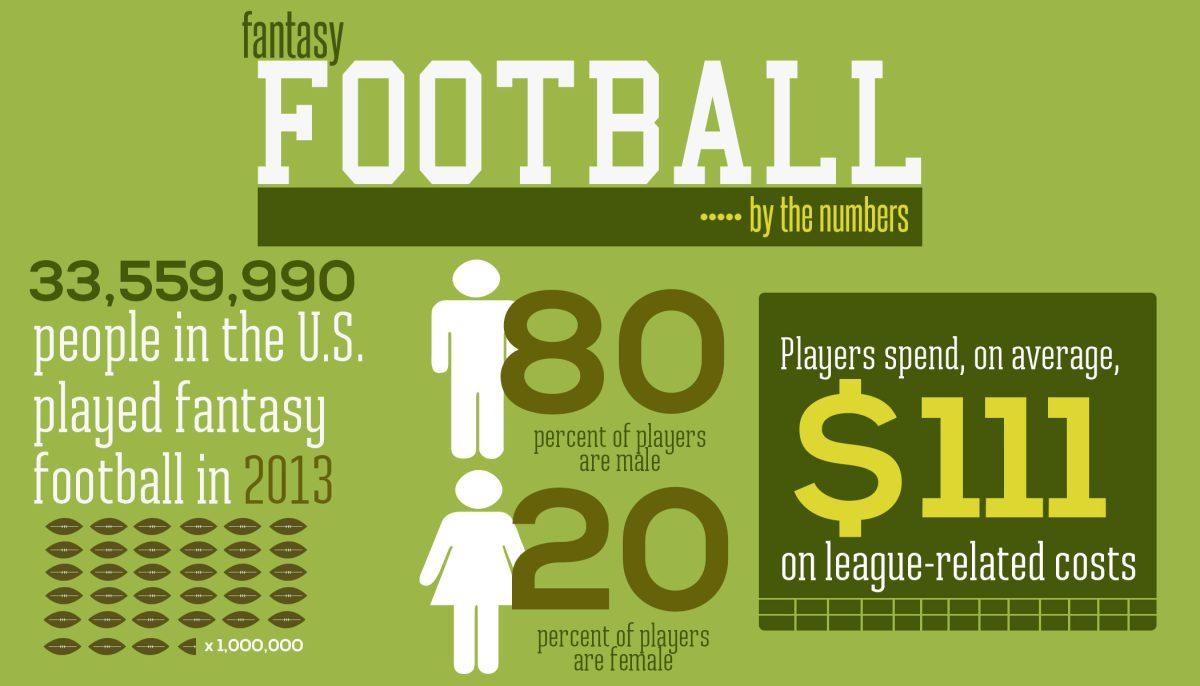At halftime of the Broncos/Ravens opening game for the National Football League this year, Wes Welker had seven points in a points per receiving (PPR) 12 man league. Julius Thomas, a tight end who had one professional receiving catch before the game, had four catches and two touchdowns. The difference between these two players is thousands of fans and rivals alike drafted Welker, and few gave Thomas a second look. Now, Thomas is fantasy gold and you can bet thousands of people look at him on the waiver wire.
Yes, the NFL is back, and so is the magical, made-up sport of fantasy football. For the last month, eight to 20 team leagues of men and women have drafted, traded and colluded to form teams that could carry them to the end of the season. Some play for fun, some play for money and some play for punishments and rewards unimaginable by those outside of the league. Under the table deals will be made while losers will be shamed until the start of the 2014 NFL season.
Fantasy football is an accessory to watching real football players in action on Thursday, Sunday and Monday night. Before the season begins, a group of family, friends or strangers hold their own fantasy draft to recruit players online to form their team. You want Tom Brady to play alongside Ray Rice? Sure. You want Drew Brees and Calvin Johnson on the same team? Why not? You want the Cowboys’ defense and Mike Vick to have something in common? Nobody really wants that, but go for it if it is your thing. Jack Donovan, current Bay St. Louis High School assistant coach, said he believes high school students use fantasy as an additional way to keep up with their favorite players.
“High school students and other fans are able to look for on the field achievements as well as game time performances,” he said. “That can be inspiring.”
Shaping the interactive media was not a fast process. Before we had the ease of laptops and professional websites doing the dirty work for us, people would tally points like the old people you see in bowling alleys who write a strike as a big X.
Fantasy football originated in August1963, in Oakland, Cali. The inaugural title of the first fantasy league was the “Greater Oakland Professional Pigskin Prognosticators League,” which is almost better than any half-baked league name my fraternity brothers can come up with in our league. In 1963, participants of that league probably had no idea they created a franchise as they sipped moonshine and drafted whatever up-and-coming college kid sounded familiar.
Between the NFL, different hosting sites, transaction fees and media revenue, fantasy football and other fantasy sports have turned into billion-dollar industries. That is more money than the Oakland Raiders, whose fans started it all, have ever seen from ticket and nacho sales combined.
Much like how the steam engine revolutionized American industry or the transformation of the middle of the doughnut into the doughnut hole, technology revolutionized the fantasy industry. The break-out year for Fantasy football on the Internet was 1997. CBS Sports launched a free public Fantasy football website where individuals used theirAOL email addresses to log on and draft men like Terrell Davis, John Elway and Barry Sanders. From there, theindustry boomed over the next decade-and-a-half with an estimated 30 million people playing Fantasy football in 2012, according to the Fantasy Sports Trade Association.
While the same formula has been applied to create fantasy baseball, basketball, hockey and other sports, football remains the industry giant and fan favorite. Each year, family members form their annual leagues, and coworkers make up dynasty leagues that go on for years. Podcasts and magazines outlining this year’s sleepers fill our spare time until our own league’s Super Bowl each year. The heart of fantasy really remains about fans’ love of the game and the peoplethat make up each league. John Nicholson, communication professor at Mississippi State University, summed it up best when he said Fantasy football was an amalgamation of favorite pastimes.
“Ultimately, fantasy football allows people to combine three things we love: sports, competition and doing things with friends or family,” he said.








